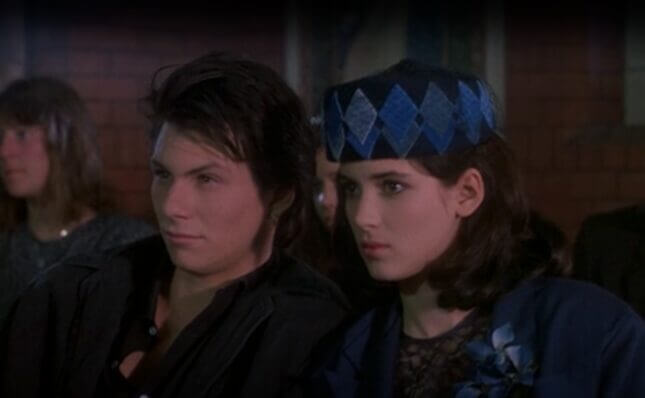Rewatching Heathers, the Violent Dark Comedy That Made '80s Teen Films Seem Like Reindeer Games
EntertainmentMovies
Screenshot: Heathers/New World Pictures/Hulu
This week marks the 32nd anniversary of the release of the cult classic film Heathers, an inauspicious milestone that nonetheless reminds me that I am becoming old. Released in 1989 at the cusp of Winona Ryder’s meteoric rise, Heathers used extremely of-its-time dark humor to spoof suburban white high school culture, the absurdity of teen-parent interaction during the dissolution of the nuclear family fantasy and, after a decade of John Hughes, the concept of the teen movie itself. Its cynicism and biting humor were a cultural signal that the ’80s were over and the alternative ’90s were about to come crashing, or maybe languidly and skeptically sauntering, in; its depiction of Ryder as a goth-adjacent popular girl who hates it and teams up with hot loner Jason Dean (Christian Slater, serving his best Jack Nicholson) to unwittingly off her tyrannical clique was a tacit acknowledgment that the American status quo would no longer do. Teens were sick of the shit and the outcasts would soon rise up.
I have seen Heathers approximately one thousand times—rewatching it Thursday night I found myself repeating scores of lines on cue that I’d memorized by osmosis back in the 7th grade—but this week, it came to my attention that Shannon Melero, one of Jezebel’s Youngs, had not seen it. And so we came together to watch, and discuss. Lick it up, baby. Lick. It. Up. —Julianne Escobedo Shepherd
JES: Shannon, you know how I feel about this film. But what did you think of it?
Shannon Melero: Going into this movie for the first time ever, I had a certain idea of what I thought it was about based on pop culture references I’ve heard over the years. It turns out that this movie is not a wholesome teen flick about the outcasts taking down the school bullies. It is actually super violent! And while I know this is from a different era, I found it weird that this movie is still considered such a cultural touchstone despite how lightly it takes suicide, bullying, and guns in a school setting. Hits different in a post 9/11, post-Columbine, post-Sandy Hook, post-Parkland reality!
-

-

-

-

-

-

-

-

-

-

-

-

-

-

-

-

-

-

-

-

-

-

-

-

-

-

-

-

-

-

-

-

-

-

-

-

-

-

-

-








































